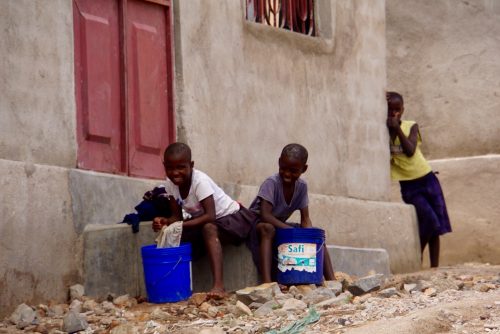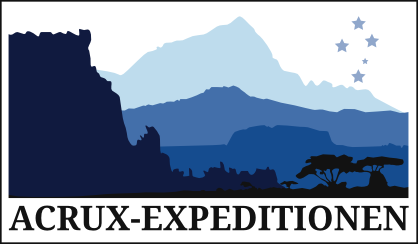Disaster
[Note: I am aware that I am four translations of posts behind. They will come in due time (two of them are already translated, but not yet posted), but we thought this post was so important that we would post it immediately anyway.]
We were riding in the hills above Lake Malawi. The sun was setting and coloring the sky in nice pastel colors. We passed by a local football match. Camilla tapped my shoulder and pointed to the view. The events of the previous two days seemed to have happened ages ago.
—
“Are you sure he is seeing you,” Camilla asked tensely.
“I don’t know. I don’t think so!” I stopped. The truck, which had started from a coal mine to the right of the road, was now completely across the road ahead of me. He was turning towards me. The seconds were ticking away and the tractor passed by my left side. The wheels of the trailer, almost as tall as me, were approaching fast. I realized that he was not going to stop.
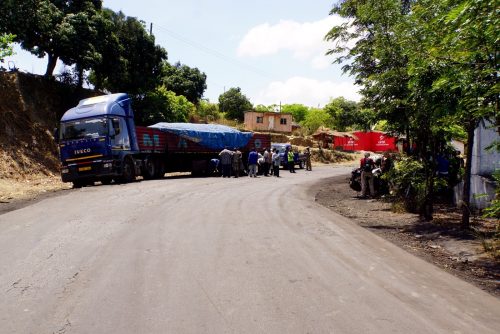
I don’t recall how, but Camilla, who was stopped about 50 meters behind me, told me that I rose from the seat and jumped elegantly to the right. I let the bike fall. I sprinted away, at first away from the truck, but then I turned and ran furiously towards the cab. I jumped on the passanger side steps and knocked deperately on the steel plate and the windows with clenched fists. I screamed out like crazy. The truck stopped, but it was too late. Two of the three wheels on the trailer were already solidly planted on top of Amelia, my poor motorcycle. The driver ran away on foot.
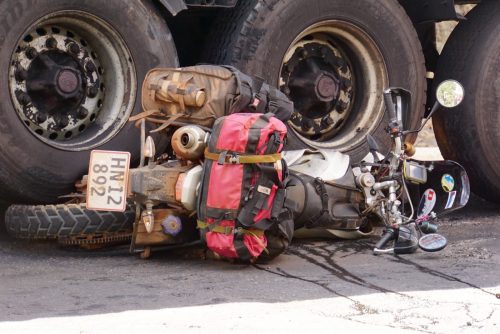
Poor Amelia.
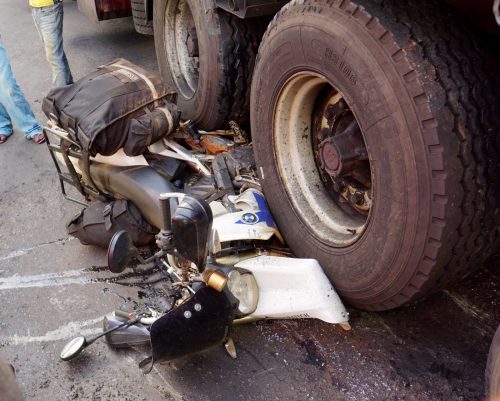
The previous week had consisted of hundreds of kilometers of dirt tracks, punctuated by stays at wonderful lodges and campsites along Lake Tanganyika, the world’s second longest lake. We had entered Malawi, and had spent two days up at Mushroom Farm, at the mission and university town Livingstonia in the mountains above Lake Malawi. Two siblings from Minnesota had wanted some adventure in their life after graduating college. They had googled “lodges for sale in Africa” and ended up buying the first hit, Mushroom Farm. It was a wonderful place. Very chill and with great food. The road up there, however, was in an atrocious state. 19 steep hairpins on rough gravel and skull-sized rocks. The 10 kilometer up took us an hour and a half. Camilla declared that it was by far the most difficult thing she had done on this trip. She fell over twice going up (and twice going down). It might also have been the hardest terrain I ever traversed on a motorcycle. Later on, we met two britsh-south african bikers, who had given up at the sight of the first incline. They thought Camilla was amazingly tough for having done it.
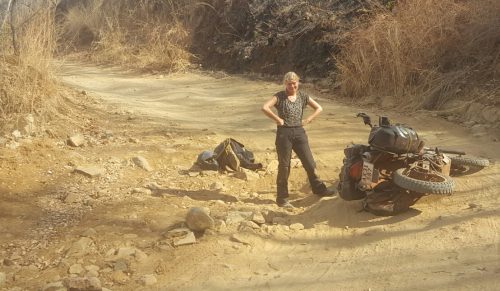
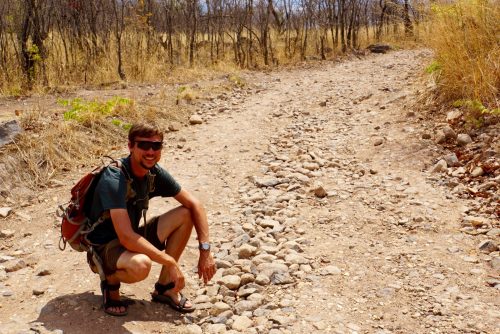
It’s difficult to capture it on photos, but we’re far away from tarmac roads.
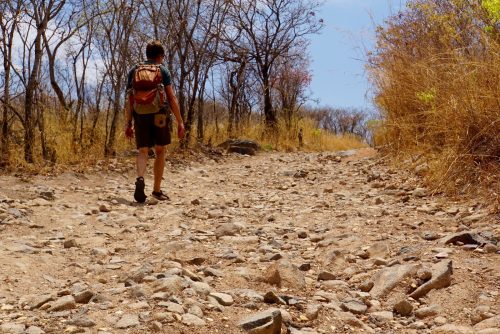
Amazingly, no stones have caused any punctures yet.
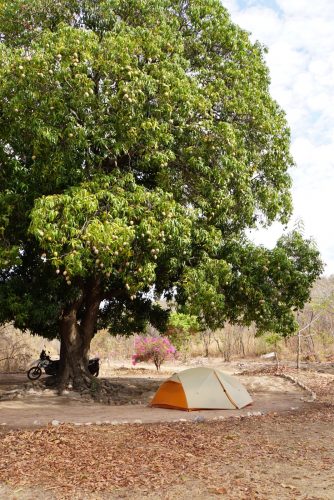
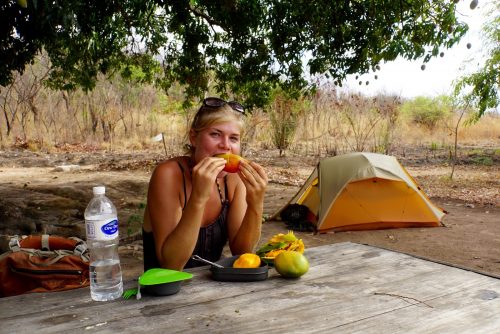
When you are living under a mango tree…
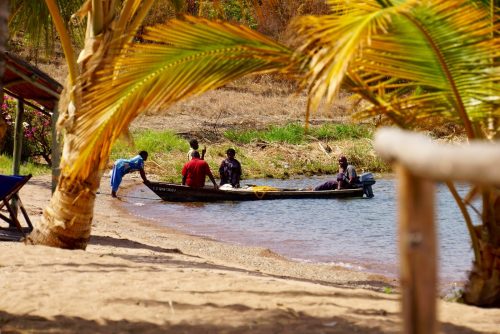
This guy brought the dinner.
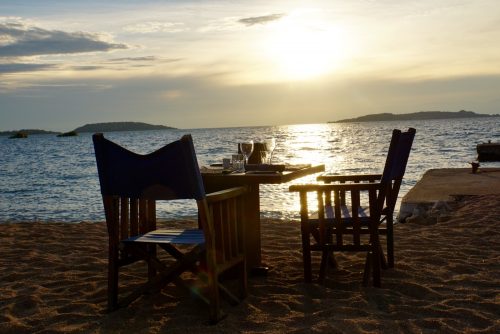
Every night we had a three course dinner right at Lake Tanganyika.
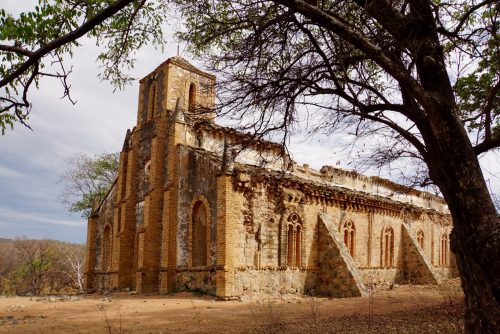
The remains of Kipili Mission (1895).
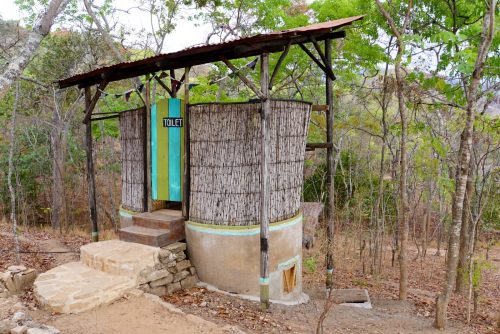
Toilet at Mushroom Farm.

By far the most creative and artsy toilet on this trip!
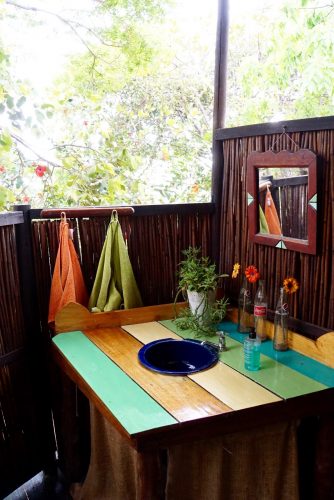
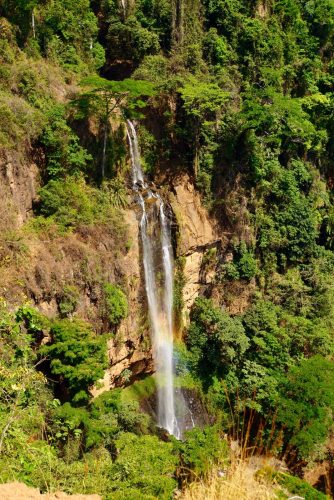
Water fall near Livingstonia. Locals bathe in one of the nearby pools.
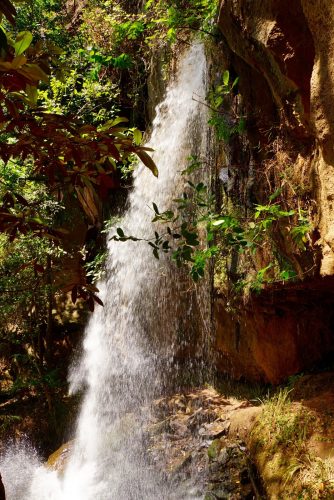
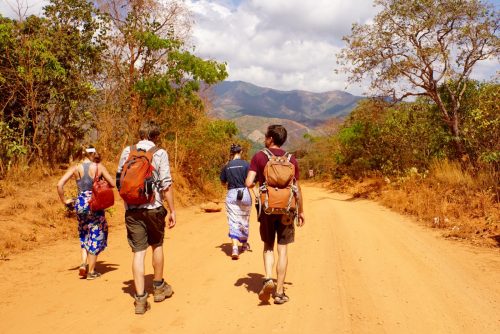
We hiked to Livingstonia with Gary from England. The girls from South Africa ventured down to the base of the falls.
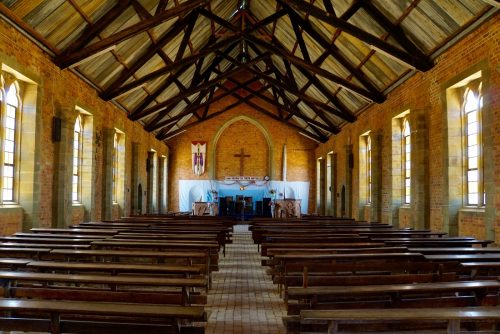
The church of Livingstonia. Every Sunday, about 500 people show up for service in this tiny village on the top of a mountain.
After getting ourselves down from Mushroom Farm, we followed the main road south. Shortly after, it broke of from the lake into the mountains. The tarmac was good and the views great. 25 kilometers after leaving Mushroom Farm, my bike was under a heavily overloaded coal truck. After a minor panic attack from Camilla, I managed to ensure her I was okay. A swarm of people had descended on us and the truck. I started saving my luggage, and asked people to call the police. They did, but also informed me that the local police did not have any vehicles, so I would have to take a bus down to the town and get the police officer myself. I did not want to leave Camilla behind. The whole situation was a bit too much. A thousand thoughts flew through my head, but it was clear that I could not keep going on Amelia. I pushed all thoughts of the future away and decided to deal with the immediate situation at hand.
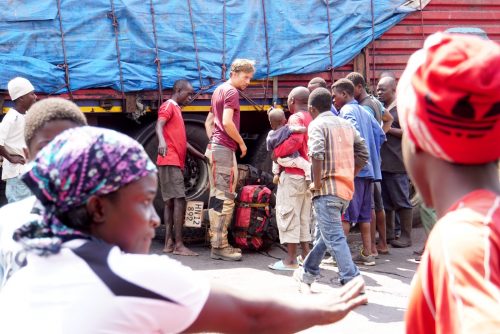
Many people had an opinion – people just spoke to us, even in the local language.
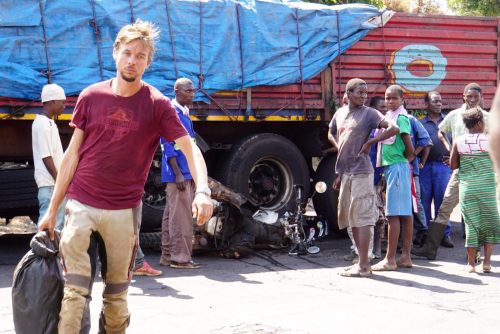
Many thoughts going through my head.
On this entire trip, we have met less than a handful of bikers like us. But ten minutes later, I looked up the road and saw a big Yamaha headed our way. A miracle! John and Irene were a couple from Nairobi coming home from a month-long trip south. Irene stayed with Camilla, and John took me to the police station on his bike. John was a large man used to get things the way he wanted them. In no time, he had organized a pick-up truck for the wreck and a police officer to stuff into it.
After that, things went step by step. The police officer, a novice with poor english skills, who did nothing to take control of the situation, started taking measurements and documenting the situation. Meanwhile, John and I – mostly John – had the coal mine workers lift the trailer with large hydraulic jacks to get the bike out. That operation took a couple of hours, but finally Amelia was free. The police officer impounded the truck, I mounted Camilla’s bike with her on the back, and with the pick-up and the wreck up ahead, our weird procession ventured to the police station.
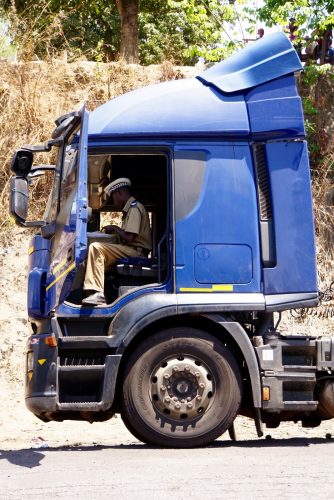
The young and inexperience police officer in the offending truck.
The truck driver, who was from Tanzania, disappeared. I got two explanations. Either he ran because he thought I would kill him – routine procedure in Tanzania, according to the Malawians. Or he ran because he thought he had killed me. No matter what, John reached the owner of the truck by phone. He accepted responsibility. John and Irene then followed us to the nearby Hakuna Matata Camp, and went on their way north. They were an invaluable help.
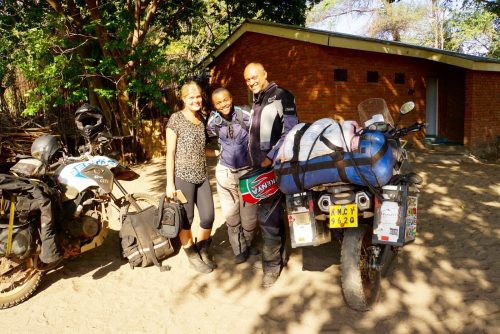
Our fabulous helpers, Irene and John.
Hakuna Matata is owned by Willie, an exccentric, but very helpful South African. He offered to store Amelia there, at least until we found out what should happen later. As he said, “the police here are the biggest thiefs. If you leave it with them, it will be gone in a week.” And true to form, the next day somebody had already stolen the auxillary LED headlights from the supposedly safe parking spot in the cell block.
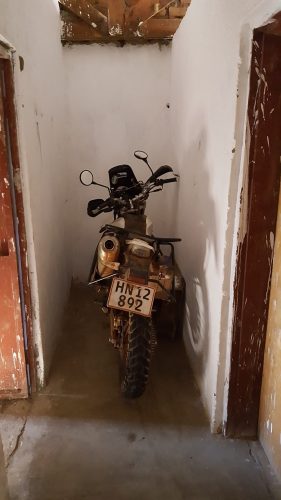
Amelia parked “safely” in the cell block.
The following day, we went the 85 km to Rumphi to visit the district police station. A very friendly traffic police chief accelerated the report writing. A process which would normally take a week now took a good half day. The biggest drama happened when the accounting office realized I was white. A police abstract normally costs 3000 kwachas (about $5), which I had duly paid. For foreigners, however, it costs a whopping $100. Camilla tried to negotiate, but we left the station with our wallet $100 lighter. In the other hand, however, we had a piece of paper, which will hopefully be several thousand dollars worth with the help of the insurance.
As we arrived back at Hakuna Matata, we met Jeff og Roz, two Canadian retirees, who are cycling the world. Willie had told them about us, and they hugged us almost immediately, relieved that we – two complete strangers – had not been hurt. We had a great night exchanging war stories with them. Next day, Wille, Jeff, and I went and picked up the bike from the police. We thanked them all and went south.
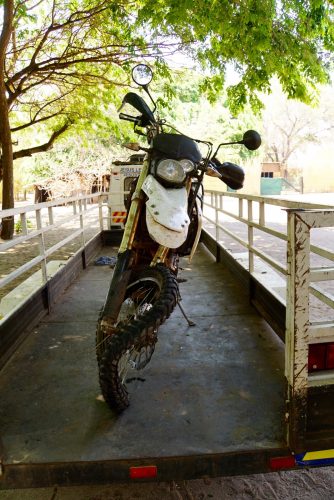
So long and thanks for all the fish, Amelia.
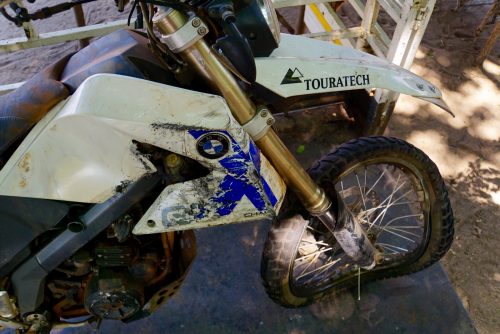
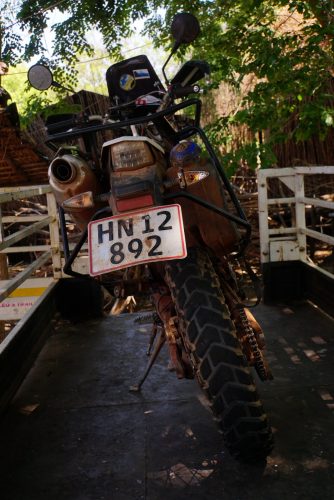
Hmm, the rear light and the wheel used to be aligned…
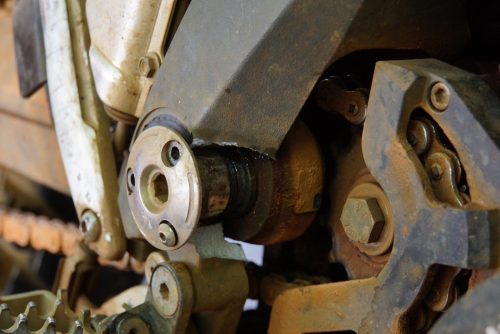
… ah, the swing arm mount has been ripped out of the frame!
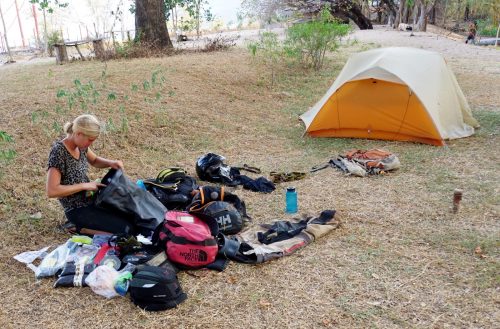
We re-pack the bags, trying to fit everything one one bike. 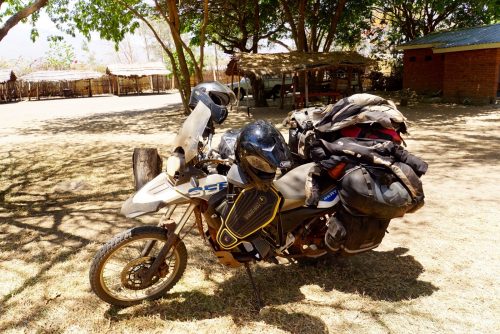
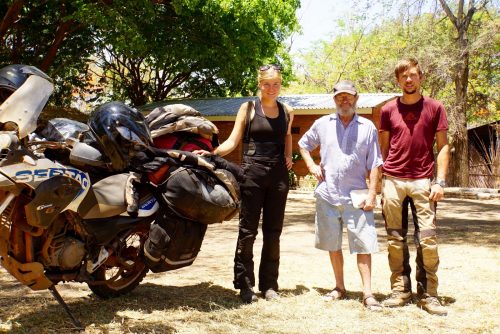
Willie, the very friendly owner of Hakuna Matata Camp.
Now we’re in Blantyre, where we have spent a couple of days dealing with insurance and customs bureaucracy. And getting visas for Mozambique. The insurance process should be started now, but who knows if I ever get any payment. At least our insurance guy seems competent. A bigger problem is the 3000 euro deposit I have placed with ADAC in Germany for the Carnet de Passage, the import/export permit for African countries. I’m afraid those money are gone, as I will have to take the bike back to Europe to get them. But that’s okay. We’re safe, and can always save up for a new motorcycle.
So far, we have managed to do the 800 km from the coal mine to Blantyre two-up on Camilla’s now heavily loaded bike. We expect to continue this way. The plan is to go through Mozambique to Maputo, where we’ll have a long planned visit from my parents. After exploring southern Mozambique and northern South Africa with them for two weeks (in a rental car), we will take the quickest route to Cape Town and ship the bike home. I Cape Town, we plan to rent a 4wd camper and explore South Africa a bit more. Riding two-up is not so comfortable.
All in all, we’re doing well and have done almost everything we need to do to close the chapter on my crushed motorcycle for now. We look forward to moving on!
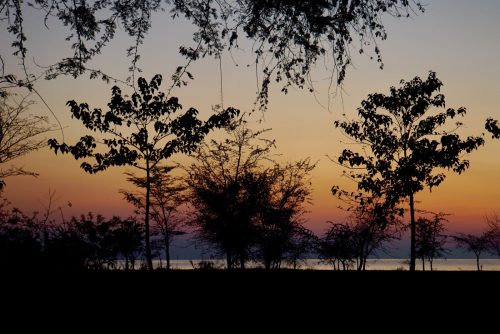
Sunrise over Lake Malawi.
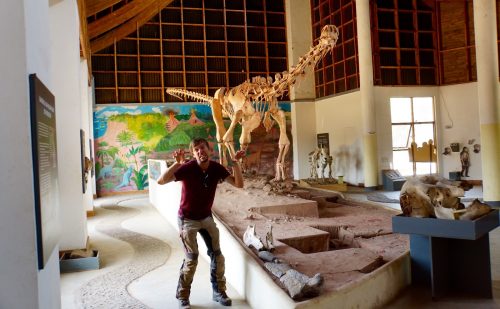
The friendly herbivore Malawisaurus (yes, that is its name), displayed at the museum in Karonga.
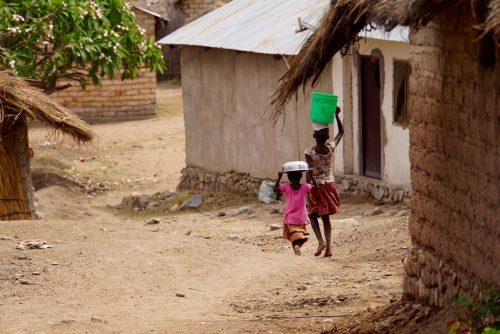
Practice makes perfect.
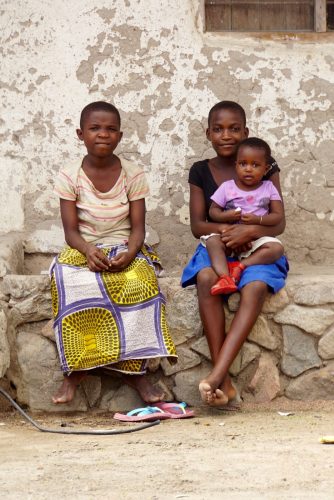
Muzungu take a picture! Uhm, okay…
